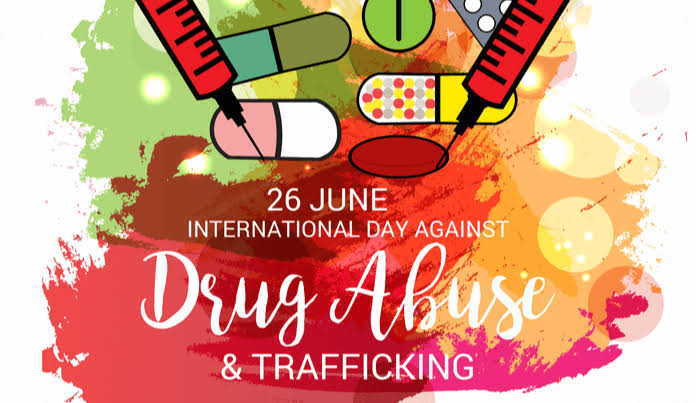The International Day against Drug Abuse and Illicit Trafficking or World Drug Day is marked June 26 annually. It is aimed at strengthening action and cooperation in achieving the goal of a drug abuse free world.
Drug is a substance used for medical purposes that can change the state or function of the body. Drug abuse is a situation when drug is taken more than is prescribed. United Nations Office on Drugs and Crime, UNODC, for two decades has been assisting to make the world safer from drugs, organized crime, corruption and terrorism. The organization has shown commitment to achieving health, security and justice for all by tackling these threats and promoting peace and sustainable well-being.
On yearly basis, UNODC issues the World Drug Report, full of key statistics and factual data that are aimed at providing direction on the state of drug use, abuse and trafficking.
In Nigeria, the National Drug Law Enforcement Agency, NDLEA, established in 1989, has been making efforts to collect relevant information on drugs through variety of drug indications for policy formulation. The impact of agencies like NDLEA in terms of intervention strategies and control is tremendous.
Study findings reveal that drug abuse and trafficking are increasing at alarming rate among Nigerians, youths especially and if nothing is done very fast, the country’s future will be gloomy.
Illicit Drug use and trafficking are caused by cultism, peer pressure, poor parenting, broken homes, joblessness, low self-esteem and many more.
Drug abuse leads to insanity or psychological imbalance, loss of income, broken families and relationships, expensive health care costs, destruction of private and public utilities, road accidents, increased crime and many others.
The effects are all encompassing, affecting individuals, families, governments, religious organizations and the society at large. In fact, illicit drug use and trafficking need effective and efficient collaboration to snuff life out of it. It is not what government agencies and non-governmental organizations can do alone. It requires the concerted efforts of every member of society.
Parents must endeavour to have united families and to regularly monitor their children and wards. There is need for consistent and constant sensitization at the Federal, state and grassroot levels of government on the dangers of illicit drug use and trafficking and empowerment of youths to prevent idleness which gives room for them to engage in the vice. Government agencies must be properly empowered and funded to control the sale, distribution and consumption of drugs.
Religious organizations should also join in the fight by having programmes that are youths -inclusive through which they will constantly preach against involvement in drug use, it’s consequences and dangers.
There is also need to treat people who use drugs with respect and empathy in order to encourage them have access to evidence -based treatments that offer alternatives to punishment, prioritizes prevention and leads with compassion. As captured by theme for this year’s World Drug Free day commemoration: “People first: stop stigma and discrimination, strengthen prevention.” The theme will also create awareness on the importance of combating stigma and discrimination against people who use drugs by promoting language and attitudes that are respectful and non- judgemental.
These recommendations are considered and implemented, they will go a long way in engendering a drug-free society.
Written by ANENE ONYILEGBE





Comments are closed for this post.